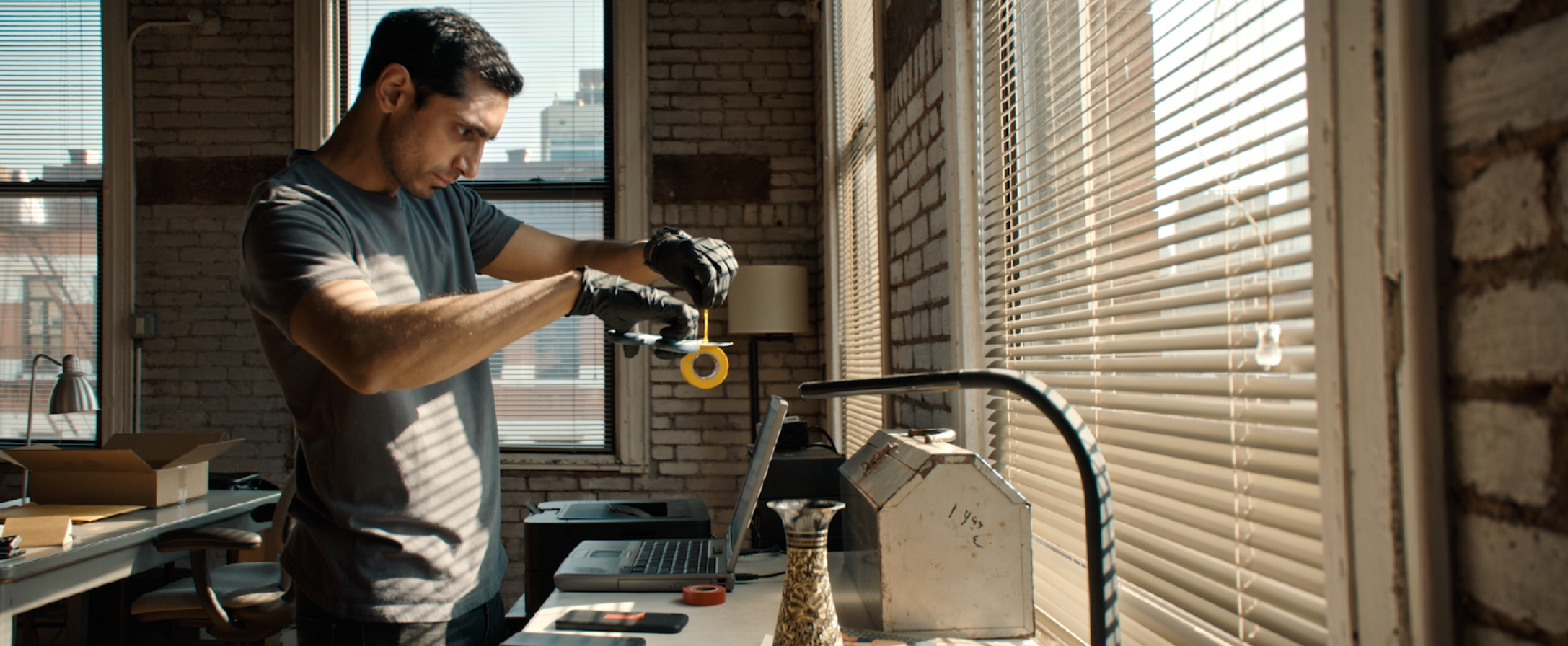‘Relay’ Movie Review: Taut Paranoid Thriller Comes Close To Greatness
Photo from Bleecker Street
From Jeremy Kibler
In David Mackenzie’s Relay, phone conversations and trips to the post office somehow make up what is about as taut and engrossing as any paranoid thriller from the 1970s, like The Conversation and Three Days of the Condor. Director Mackenzie (Hell or High Water) and writer Justin Piasecki intrigue from the word go with a concept that feels current and high-tech but also analog. It’s so urgent and carefully devised that the only snag is the final twenty minutes, which deflate the sly, involving greatness Relay was thisclose to achieving.
Constantly changing disguises in New York City, Ash (Riz Ahmed) is a fixer, a faceless middleman working for a tri-state relay service that ensures untraceable anonymity between whistleblowers of evil corporations and the messaging service. His latest client looking for protection is Sarah Grant (Lily James), a frazzled scientist who worked for a biotech company. After discovering dangerous side effects in a new strain of wheat crops, she’s in possession of materials that are evidence from a legal cover-up. Instead of going public, Sarah reaches out to the relay service. Because she’s violated her NDA, a task force in a surveillance van is following and harassing her.
The process of intermediary communication via a special keyboard for the deaf would sound mundane to watch on screen, but how it plays out is endlessly fascinating. Ash isn’t deaf, but the operator at the call center verbally facilitates talk-to-text conversations between Ash and Sarah. Nothing is recorded. Ash’s voice is never heard. For the conversation to continue, the recipient (in this case, Sarah) will say the words, “go ahead.” It’s almost a foolproof communication system.
Riz Ahmed (Sound of Metal) is a brilliantly controlled and internal actor, conveying a strength and a precise process that’s really part of his armor hiding so much vulnerability. With Ash being a recovering alcoholic, all he can do is help and protect others. Ahmed’s non-verbal exchanges with Lily James are concise and compelling, forcing us to hang on every word. On her own, James is quite good, considering she’s mainly a pawn in the plot. When they do get to talk directly, Sarah and Ash share a benign banter over the word “alright” being one or two words and his evidence being in a song by The Who.
On the antagonistic side, a swaggering Sam Worthington and a snacky Willa Fitzgerald serve their function as two agents who are part of the task force watching Sarah’s every move, but these roles could have been played by anyone. Eisa Davis makes more of an impression in only a handful of scenes as Ash’s AA sponsor, Wash.
For a film that should sound dull on paper, director Mackenzie enthralls our attention on a technical level as well. Cinematographer Giles Nuttgens brings a fluidity to the camerawork, including a Hitchcockian chase in a Broadway concert hall, and the score by Tony Doogan is funky, propulsive, and wholly unexpected. With so much going for it, Relay becomes one of those films that starts off so strong and then takes one fatal misstep. With twenty minutes to go, the filmmakers detonate a plot twist that’s so frustratingly routine and unsatisfying that it negates everything preceding it, and for what? It comes out of nowhere, and that’s supposed to be enough.
This rug-pulling re-evaluation of the first 92 minutes doesn’t render the entire film a stinker, but with a reworked finale, Relay could have been exceptional. As is, it’s still a gripping, terrifically crafted conspiracy thriller that, once the other shoe drops, is still solidly watchable. Now, go ahead.
Rating: 3.5/5
Relay is currently in theaters.

